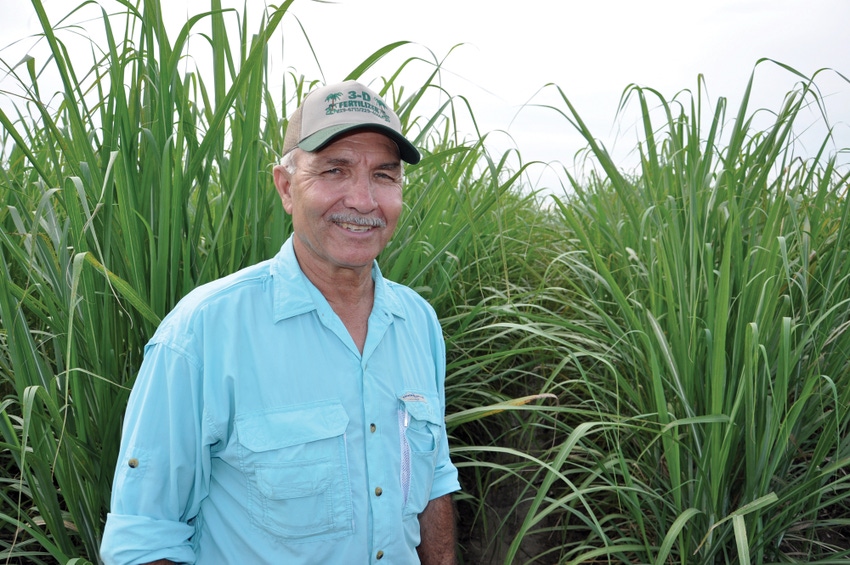
It takes a diverse array of specialized equipment to make a sugarcane crop in Louisiana, and much of it comes from on-the-spot innovations – or what producer Ronnie Gonsoulin, of Ulysses Gonsoulin Sons, calls “Cajun country engineering.”
Gonsoulin farms about 6,000 acres of sugarcane in a rotation with soybeans, with his son, Keven, around New Iberia, La. It’s a wet, sub-tropical world down here, receiving an average of 68 inches of rainfall every year.
It makes for some tough conditions that can stress the coolest of farmers. But Gonsoulin doesn’t let wet, wild weather get in the way of properly managing his crop. He and other farmers in the area are known for innovative equipment designs that perform under the messiest conditions.
The end result doesn’t have to look pretty either.
Check out some of Gonsoulin's ideas: If you can't buy it, build it
Take for example, the vegetable tractor Gonsoulin acquired from Washington state for spraying crops in wet conditions. He replaced the tractor’s thin rubber wheels with even thinner iron wheels the Gonsoulins made in their shop. The wheels have spikes on the side which grip the side of the cane row – which is significantly deeper than most Delta furrows – to help pull the vehicle through tough conditions.
If a heavy rain has soaked a field, no problem. The tractor wheels slice through potential trouble like a knife through butter. “In some soils the wheels will go down about six inches into the soil, in heavy blackland, 10 inches to 12 inches,” Gonsoulin said.
Another tool is an extension wheel on tractors equipped with steel blades to grip the side of the row.
Custom tools
With about 400,000 acres of sugarcane in Louisiana, produced by 650 growers, there’s not a vast industry specializing in tool and implement making for the crop, Gonsoulin notes. “We custom make tools because you can’t pick up the phone and buy this particular tool or that particular tool. We take some things that other people have made and modify them for our needs. It works. It really works well.”
For example, Gonsoulin added a bigger shoe to a parabolic subsoiler to create a larger water channel in his sugarcane fields. “We added disks in the front to chop, and at the back to rebuild the row. So we took the tool that was already made and enhanced it.”
The Gonsoulins even produce bearings in their shop on occasion, something they’ve started doing to offset rising costs.
But their hearts are in shaping steel. “On this farm we can build practically anything,” Gonsoulin said.
Sugarcane/soybeans a good rotation partner for Ted Broussard
For example, Gonsoulin wanted his harvest to run more efficiently in wet conditions. He took a Case 9330 articulating tractor, “stretched it” by 8 feet and added a sugarcane dump wagon to the back. He added an extra axle under the wagon to help distribute the weight and carry as much as 10 tons of cane. “The implement was built for the mud,” Gonsoulin said. “When you’re pulling a wagon through wet conditions, the tractors will tend to dig and spin. This way, you’re carrying the wagon, so it doesn’t spin.”
It took Gonsoulin and a local welder about a week to complete the job. “It took a little bit of thinking, but it was fun,” Gonsoulin said.
What Gonsoulin can’t do in-house, he farms out to a local job shop like Vernon Manufacturing. Or he will take a design from a manufacturer like Roll-A-Cone and adapt it for his own use. These shops do a lot of business in sugarcane country and help keep equipment costs down for farmers, even if the end result isn’t always easy on the eyes. For example, a sprayer manufactured by Vernon has a Caterpillar engine with hydraulic drives and John Deere cab on a Case body.
It’s not about looks. It’s about getting the job done effectively and inexpensively. It’s creative thinking, Cajun style.
Innovation at a cost
Gonsoulin would normally have spent $40,000-$50,000 on a new blade to do dirt work around the farm. Or he could noodle out a design in his head, as he did recently. To make the blade, he cut a metal pipe in half. The blade was too rounded, however, so he laid the pipe on ground and “crawled” on top of it with a dozer “which opened it up. Sure enough it worked. We had what we wanted. It works real well behind a 240-horsepower tractor. I went out and got a piece of scrap pipe, cut it out, bought a little steel, and put it together for probably $15,000. So there's $15,000 or more that’s in my pocket, not someone else’s.”
Gonsoulin also built a tool that helps him minimize tillage when taking out old sugarcane rows. “We haven’t plowed in 10 years, and we stay on the same row. The tool will break up the stubble and hip it back together in one pass.”
While it could take weeks for Gonsoulin to describe how each unique piece of equipment in his shop yard came to be, he points out that innovation can come at a cost, another reason why local job shops are important.
“The time it takes to build an implement removes managing time for your crop. Whenever you start building something, it requires a thought process. It’s tough when you’re committed to a project, and you’re distracted by having to spray for insects. On the farm this size, you had better have your act together.”
When a good plan comes together, the result is gratifying. On a recent day, Ronnie and his son, Keven were discussing which field the modified vegetable tractor needed to spray next. “I wish we had two of them” Keven said.
Sounds like another winter project for the Gonsoulins.
About the Author(s)
You May Also Like






